#Tevinter Knights
Explore tagged Tumblr posts
Text
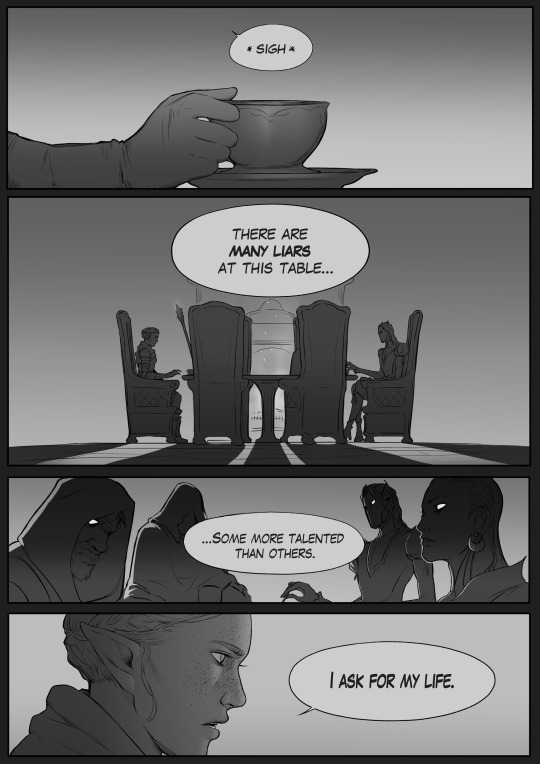
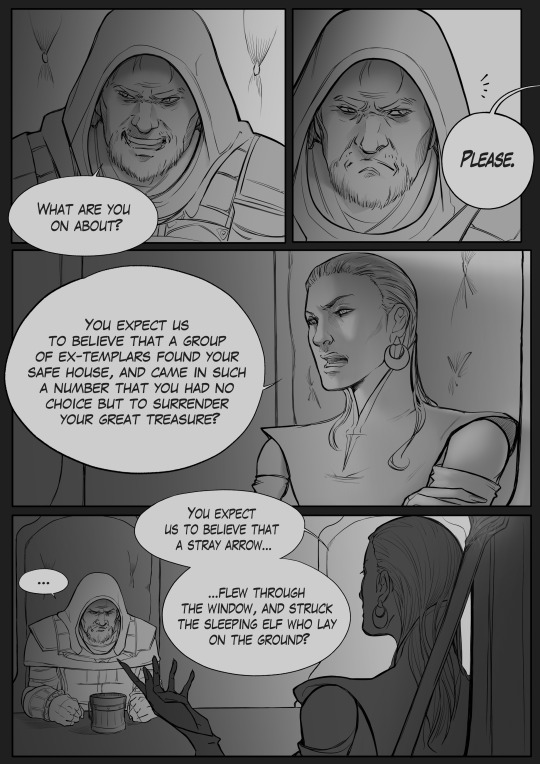
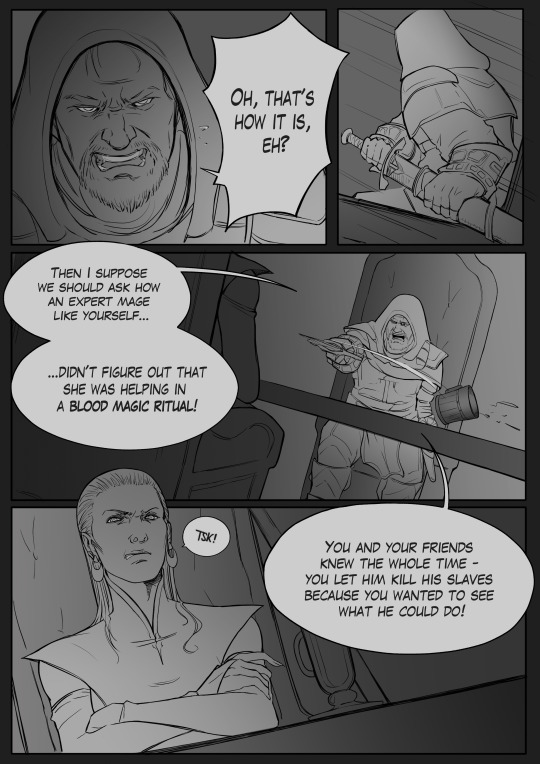
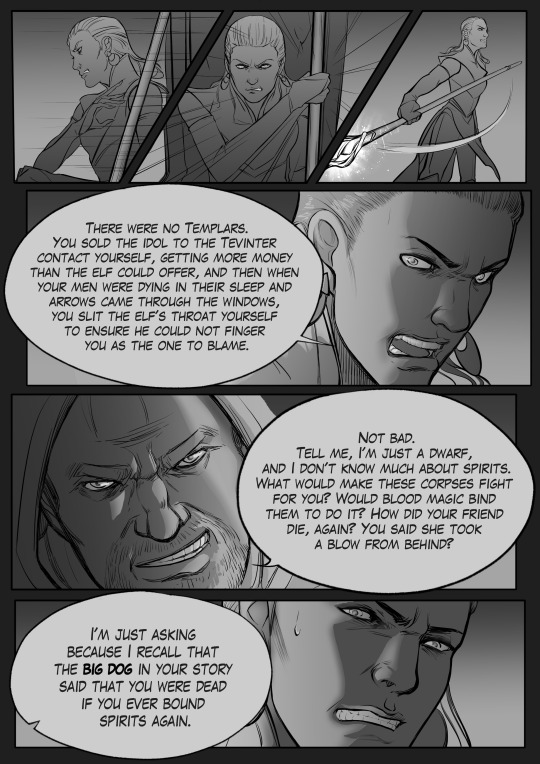
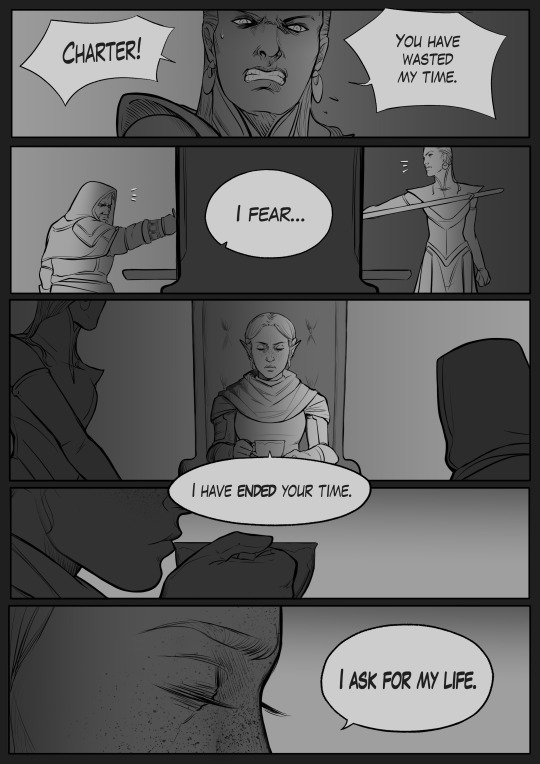


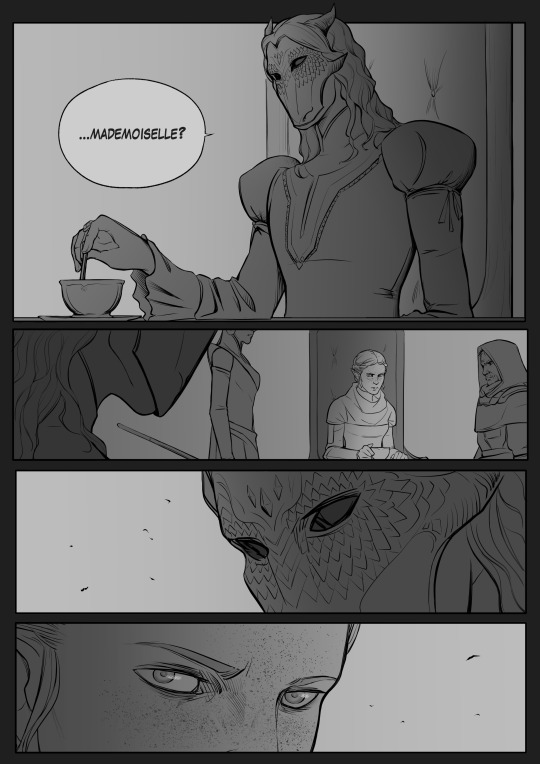
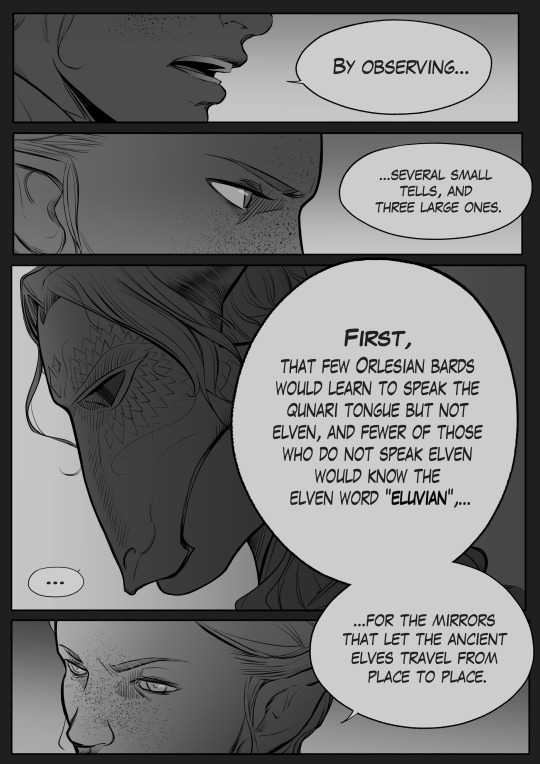
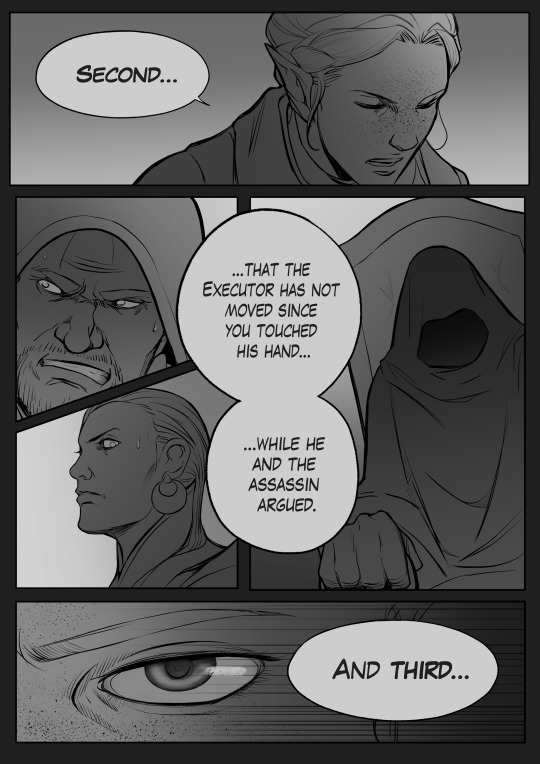
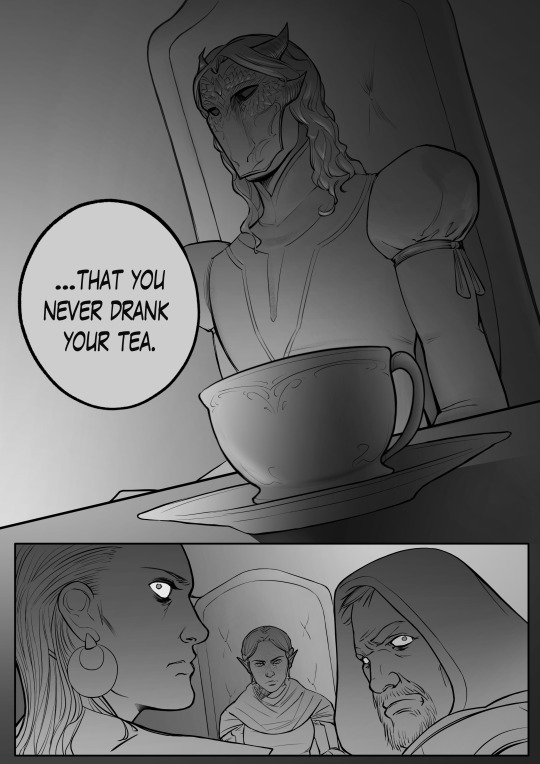
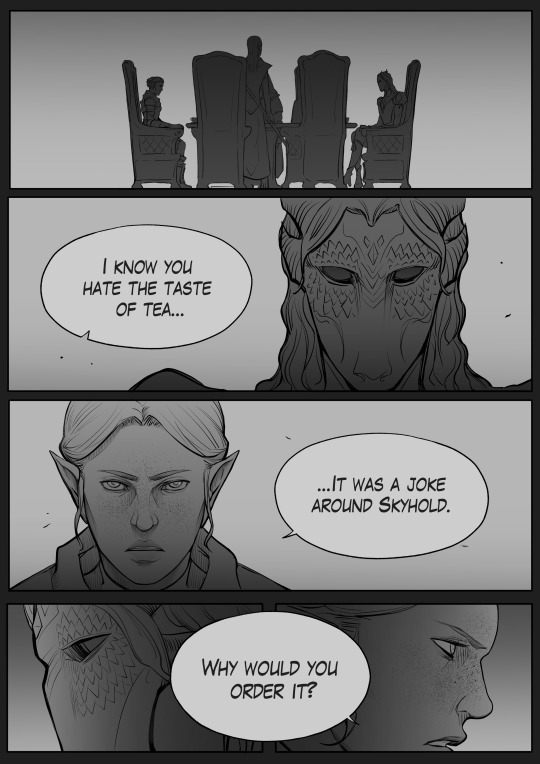
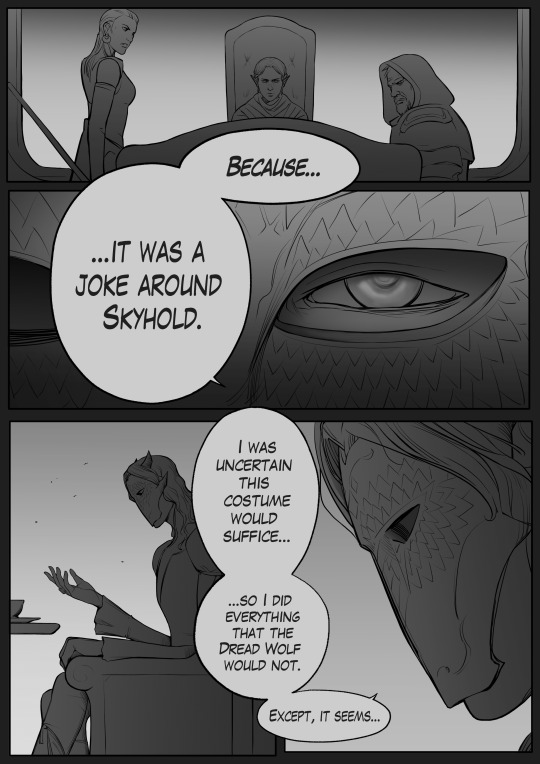
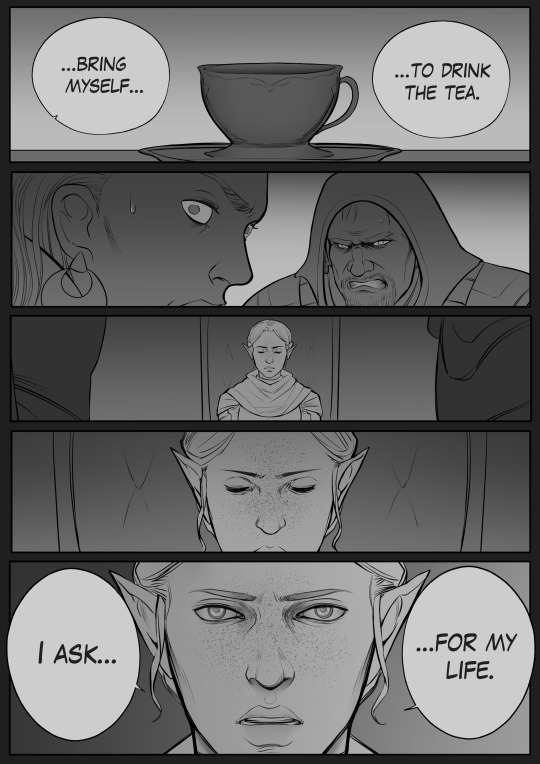
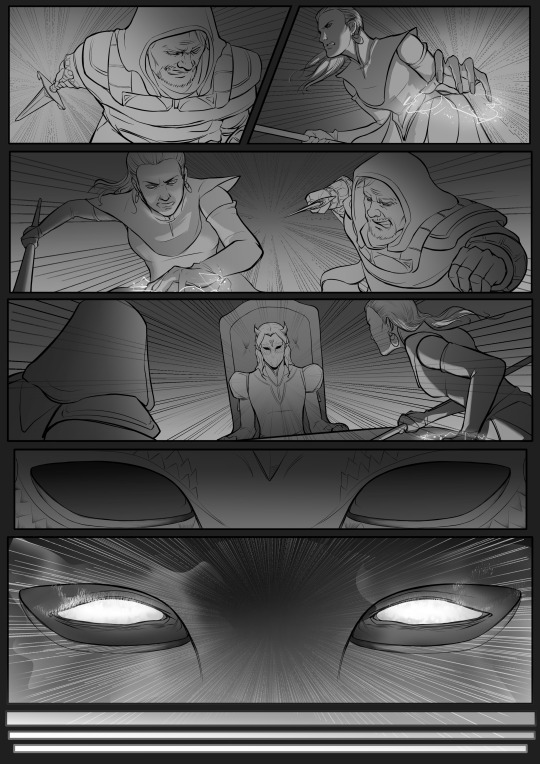
The Dread Wolf Take You (Part 1)
~~Link to the complete 31 page comic here~~
"Imagine that, overlooking the god in your mids!"
May I present, my attempt at illustrating the last four pages of Tevinter Nights. 😁 (Also, the first time I'm posting art on here!)
As the whole thing was quite literally too long to post on tumblr, I uploaded the full version on a customized site made for reading webcomics (via ComicFury). Feel free to check out the link above if you like to read the rest! Also, if you're on mobile, there's a "Scroll View" option for easier navigation. :)
And, obviously, HUGE spoilers for those who haven't read Tevinter Nights!!
On a personal note though, I can't believe I actually finished it... As it had been a *very* long time since I drew (and finished) anything, let alone a 31 page comic and reading Tevinter Nights again finally sparked my motivation (and the courage to post it lol). So I want to thank Patrick Weekes for helping me overcome this massive art block and over two decades of Case Closed mangas for inspiring me how to draw an overly dramatic "exposing the imposter" moment. 😂 I tried my best to be as faithful to the book as possible and it took me forever, so... hope you like it! :D
#dragon age#tevinter nights#dragon age dreadwolf#da4#solas#charter#tevinter nights spoilers#my art#just gonna leave this here and run away as far as possible 💀#fun fact - did you know that this chapter was entirely inspired by an old episode of the animated Batman series from 1992?#to be specific - season 1 episode 35 titled ''Almost Got 'Im''#in which Batman lures his greatest foes to a meeting while pretending to be one of the villains lol#Patrick Weekes mentioned this in a live stream#wait - does that make Solas Batman? lol#.....''The Dark Knight Rises''...''The Dread Wolf Rises''....#oh I see it now lmao#I love this chapter and this ending so friggin much I just HAD to do something for it 😁❤️#gotta live up to my url here lol#monsieur gauche my beloved <3
2K notes
·
View notes
Text
The Viper outfit




Tevinter Knight armor




Clandestine Caster's Cowl armor




by Sperasoft, a Keywords Studio
#I like the tevinter knight armor in the picture#it matches the concept: armor made from pure magic#in the game it looks like plastic#dragon age#dragon age the veilguard#dav#the viper dragon age#viper dragon age#ashur dragon age#shadow dragons#antivan crows#dragon age reference
107 notes
·
View notes
Text
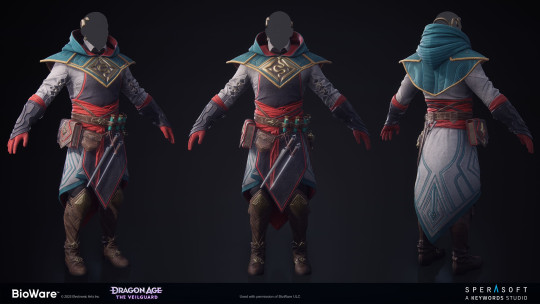









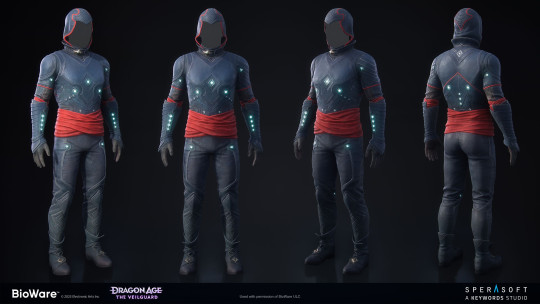












Tevinter Armor by Eugene C and Sperasoft
#revolutionary's embellished garb#tevinter knight#imperium's resolve#Shadow's Hold#Rebel's Mantle#dragon age#tevinter#dragon age the veilguard
76 notes
·
View notes
Note
You've probably already answered something like this, but I'm curious how hands on was Bioware when you were writing the Dragon Age comics?
Did they give you free reign over the story or did they expect you to fulfill a few things as you wrote? (e.g. We want the Protag to be an Elven Rogue girl and we want [insert established character here] to appear in later issues)
They were a wonderful combination of hands-on and hands-off.
By that we mean that they were collaborative, and gave excellent, story-and-character-driven feedback. And they were involved in initial plotting a lot. But they let us write the drafts on our own, and gave the feedback in a timely and respectful manner that never felt like a heavy hand.
They definitely had things they wanted us to do at times, but by-and-large they mostly took what we wanted to do and shaped it to make sure it worked in their world and with their plans.
So Vaea being an Female Elven Rogue was our plan, not theirs. But they liked it. When we pitched Olivia and Calix, they did have feedback that changed the genders on them. But it was from a "keeping the story fresh and different than the dynamics we've seen in other stories" perspective, not a "we have specific plans" perspective.
The use of Varric, Sebastian, Fenris, and the cameos... those were all us asking to use the characters, not them asking us to include them.
Teia and Viago's inclusion in Deception, however, that was very much them wanting us to give you all a glimpse of characters they planned to use in Tevinter Nights.
#ask#anonymous#dragon age#dragon age knight errant#dragon age deception#vaea#fenris#varric tethras#sebastian vael#antivan crows#tevinter nights#andarateia cantori#viago de riva
108 notes
·
View notes
Text




Rook Valerius Mercar
#dragon age#veilguard#rook#qunari#dudes I committed so many crimes against pottery to afford this and max out the Shadow Dragons only to discover that#you cannot buy the ultimate gear for a faction from the shade vendor even if you are maxed out once you choose to save the other city#if I want tevinter knight armor more crimes against pottery must be committed#that said I am diminishing gaming for a bit for personal responsibilities#but when I return that pottery is done for
4 notes
·
View notes
Note
10 and 16 for the da4 hype!
Veilguard Hype Q&A!
10. Which location are you most excited about/hoping to explore in-game?
Antiva City! I've been wanting to explore it ever since having those talks with Zevran about his hometown. Is this finally going to be the game where we get to go there...?
16. What’s one crack theory you subscribe to (yours or someone else’s)?
(Are any theories really crack, here?) I will say the one I don't see A LOT of people talking about as much as I'd expect is the "Alistair's a Mage" theory, though?
HONESTLY, I'd take it a step further and say there's a lot more mages out there than anyone realizes because SO MANY abilities sound like they'd need magic to work, and I feel like some folks that just have a LITTLE magic can slip under the radar --
Like Lucanis, for example. How exactly does that "itchy" feeling he gets behind his eyes when people use magic around him work...?
(So yes, "Mage Lucanis" is my DA4 crack theory. I HAVE seen others talking about it but I've thought this for a LONG TIME!)
2 notes
·
View notes
Note
my canon romances are zevran, fenris, dorian, then lucanis
theyll break the pcs out the moment they prevent fenris from committing manslaughter
If all 4 of your canon LI had to break out all 4 of your PCs (like the Fort Drakon mission) would they be able to pull off a successful rescue mission or is there no way they’d work together?
#two antivans. two tevinters. two elves. two humans. two rogues. one mage. one warrior#one murderous heart ripper. three dumbasses tryin very hard not to let the magic lyrium knight do a team kill
544 notes
·
View notes
Text
I might be stupid, I might have the Better version of the DA Omnibus already in my hands lmao
#that's on me I didn't realize the Omnibus was the /comics/#I have the collection of the first 3 series PLUS Mage Killer and Knight Errant#have I read them all? hell no#but I have them! much like the novels#I Do want a physical copy of Tevinter Nights eventually tho#it's nice having it on kindle and it was Great for my trip when I bought it the night before I got a plane#but!!! I desire physical copies
0 notes
Text
redraw because I'm still obsessed with Neve and her long-suffering frenemyship with Knight-Templar Rana Savas in Tevinter Nights AND Veilguard

#can't believe veilguard gave Rana like 3 hours of screen time just for me!!#I'll do anything for her (except learn how to actually draw a braid)#neve gallus#rana savas#neve x rana#dragon age#linka’s fanart
473 notes
·
View notes
Text

The golden ending where nothing went wrong. They got old together, the end.
Dorian serves as Archon for 30 years, freeing Tevinter's slaves. He has a small brush with war when he takes back Seheron with Tevinter's army bolstered by Marx's Knight order. Alphonso's armada of mage powered canons protects Tevinter's shores from further invasion attempts and a new era of peace descends on its people. Marisol develops a type of magic to sooth the titans rage eradicating the last traces of the blight including Max's red lyrium arm.
#dragon age#dragon age inquisition#inquisitor trevelyan#inquisition#pavelyan#dorian pavus#dragon age art#da:i
211 notes
·
View notes
Text
How the Chantry (and Orlais) Turned Kirkwall into a Police State
One aspect of the Dragon Age series that I’ve always found odd is the way in which rather crucial political and historical context surrounding major conflicts the player must decide tends to be relegated to codices, outside materials (e.g., books), and optional dialogue with minor characters... meaning that many if not most players don’t seem to end up actually seeing it. Wicked Eyes and Wicked Hearts (Dragon Age Inquisition) in particular has become somewhat notorious for what it left out, but it’s far from unusual.
With regard to Dragon Age II, there’s a popular perception among fans that the troubles in Kirkwall can be attributed almost entirely to rogue behavior on the part of Knight-Commander Meredith and various evil blood mages. This is understandable given the overall narrative framing and Bioware’s aforementioned problem of making key context very easy to miss. But once we take a look at the full picture, it ought to be clear that the Chantry did not simply “fail” in their responsibilities towards the mages or towards the citizens of Kirkwall more broadly — they actively created and maintained the very nightmare they later professed to be dismayed about.
Moreover, despite the running Mages vs. Templars theme, the mages were hardly the only one's who suffered under Meredith's rule. Indeed, Kirkwall endured a brutal 16-year-long dictatorship (9:21-9:37 Dragon) that came into being courtesy of the Chantry and the Orlesian empire and only fell due to the mage rebellion.
Here I’ll describe in detail (with sources and citations) the story of how the Chantry turned Kirkwall into a police state and one that ultimately descended into what the writers themselves termed "genocide."
The Templar Coup of 9:21 Dragon
Our story begins with the conflict between Viscount Perrin Threnhold of Kirkwall and Emperor Florian Valmont of Orlais.
With the beginning of the Dragon Age (the era), the Orlais had experienced a major loss of territory and influence. In 9:00-9:02 Dragon (the exact dates conflict), the Fereldan Rebellion led by Maric Theirin and Loghain Mac Tir overthrew Meghren, the last Orlesian King of Ferelden (personally appointed to the position by Emperor Florian himself), and reclaimed their country’s independence after nearly a century of Orlesian occupation. These events are described in detail in The Stolen Throne. Emperor Florian, however, remained reluctant to recognize Ferelden’s sovereignty -- with peace between the two countries not being fully established until his death and the ascension of his niece Celene to the throne in 9:20 Dragon -- and may have been eager to reassert Orlesian influence in the region. Perrin Threnhold, meanwhile, ascended to the position of viscount of Kirkwall (also formerly occupied by Orlais) in 9:14 Dragon. At some point during this volatile period, Threnhold decided to raise money by charging what the Orlesians regarded as unreasonably high tolls for passage through the Waking Sea, which also controlled Orlais’s sea access to Ferelden and its capitol, Denerim.
For reference, here’s a map with my highlights:
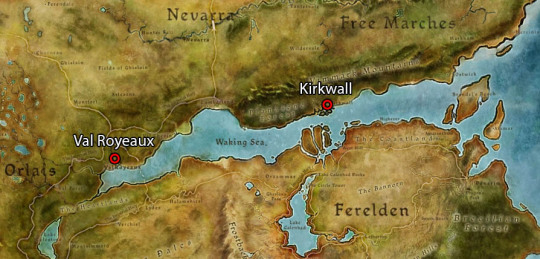
The Orlesian Chantry, founded by Kordillus Drakon I (the first emperor of Orlais), had from the beginning been dominated by Orlesian interests. According to World of Thedas vol. 1 (p. 56): “The Orlesian capital, Val Royeaux, is home to the Chantry’s Grand Cathedral, the center of the Andrastian religion’s power. Over multiple Blights, the Orlesians have used the Chantry to expand their influence beyond the nation’s impressive borders, notably to the north into Tevinter territory and southeast through Ferelden.” The Chantry, not surprisingly, had backed the Orlesian invasion and occupation of Ferelden, most recently under Divine Beatrix III (probably) and Grand Cleric Bronach of Denerim. It should be noted that this is all part of a pattern of highly-aggressive and imperialistic behavior that has persisted for centuries from the early years up to (potentially) the events of Dragon Age Inquisition.
It also cannot be emphasized enough that the Templars are the Chantry’s army and were created by the Chantry in the first place. They do not simply hunt and guard mages; they fight the Chantry’s wars and carry out its policies. Quote: “the Order of Templars was created as the martial arm of the Chantry” (Codex: Templars). According to First Enchanter Halden of Starkhaven (8:80 Blessed), “While mages often resent the templars as symbols of the Chantry's control over magic, the people of Thedas see them as saviors and holy warriors, champions of all that is good, armed with piety enough to protect the world from the ravages of foul magic. In reality, the Chantry's militant arm looks first for skilled warriors with unshakable faith in the Maker, with a flawless moral center as a secondary concern. Templars must carry out their duty with an emotional distance, and the Order of Templars prefers soldiers with religious fervor and absolute loyalty over paragons of virtue who might question orders when it comes time to make difficult choices. It is this sense of ruthless piety that most frightens mages when they draw the templars' attention: When the templars are sent to eliminate a possible blood mage, there is no reasoning with them, and if the templars are prepared, the mage's magic is all but useless. Driven by their faith, the templars are one of the most feared and respected forces in Thedas” (Codex: Templars). Likewise, a Chantry official confirms that the Templars are both “the watchers of the mages and the martial arm of the Chantry” (Codex: Seekers of Truth). In Dragon Age Origins, the (unwillingly) Templar-trained Alistair elaborates, “Essentially they’re trained to fight. The Chantry would tell you that the templars exist simply to defend, but don’t let them fool you. They’re an army... The Chantry keeps a close reign on its templars. We are given lyrium to help develop our magical talents, you see… which means we become addicted. And since the Chantry controls the lyrium trade with the dwarves… well, I’m sure you can put two and two together... The Chantry usually doesn’t let their templars get away, either.��
In response to Threnhold’s intolerable restrictions on the Orlesian navy’s movements in its traditional sphere of influence, Divine Beatrix III, an acknowledged “friend of the emperor” (and predecessor to Divine Justinia V of DAI), ordered the Kirkwall Templars under Knight-Commander Guylian to force open the Waking Sea. Viscount Threnhold retaliated for this obviously-illegal military interference by ordering the Templars expelled from Kirkwall and later executing the knight-commander. Then-Knight-Captain Meredith Stannard led the remaining Templars to storm the Keep and arrest Threnhold before appointing a weak viscount unwilling or unable to resist her control.
From Kirkwall: City of Chains by Brother Ferdinand Genitivi (Codex: History of Kirkwall: Chapter 4):
Taxes were crippling and Perrin Threnhold used the ancient chains extending from “the Twins” standing at Kirkwall's harbor—unused since the New Exalted Marches—to block sea traffic and charge exorbitant fees from Orlesian ships. The Empire threatened invasion following the closure of the Waking Sea passage, and for the first time, the Chantry used the templars to pressure the viscount. Until that point, the templars had done nothing to counter the Threnholds even though, as the largest armed force in Kirkwall, they could have. Knight-Commander Guylian's only written comment was in a letter to Divine Beatrix III: “It is not our place to interfere in political affairs. We are here to safeguard the city against magic, not against itself.” The divine, as a friend to the emperor, clearly had other ideas.
In response, Viscount Perrin hired a mercenary army, forcing a showdown with the templars. They stormed the Gallows and hung Knight-Commander Guylian, igniting a series of battles that ended with Perrin's arrest and the last of his family's rule. The templars were hailed as heroes, and even though they wished to remain out of Kirkwall's affairs, it was now forced upon them. Knight-Commander Meredith appointed Lord Marlowe Dumar as the new viscount in 9:21 Dragon and she has remained influential in the city's rule ever since.
Given that this was written by a Chantry scholar, the self-justificatory rhetoric surrounding the viscount and the Chantry-instigated coup ought not be surprising. It appears, however, that in Kirkwall itself popular perceptions of Viscount Perrin Threnhold are in fact fairly polarized.
Whereas Brother Genitivi calls Perrin’s father Chivalry Threnhold “a vicious thug who took power through a campaign of intimidation” and Perrin Threnhold “even worse,” an unnamed servant writing 7 years after the coup paints a rather different picture (Codex: Viscount Marlowe Dumar):
What happened to Viscount Perrin Threnhold was a travesty. I served in the Keep, and my blood boils when I hear people call him a tyrant. He was a good man who tried his best to free Kirkwall from the control of those who use power for their own purposes. It's always been that way here, hasn't it? Long ago it was the Imperium. Then it was the Qunari, then the Orlesians, now the templars... when have we ever ruled ourselves? He tried to kick those templar bastards out and give us real freedom, and what did it get him?
Whether Threnhold was an evil tyrant or a nationalist hero (or both or something else entirely) is beside the point, however. He was not overthrown for mistreating the citizens of Kirkwall; he was overthrown for opposing Orlais and the Templars (acting as an arm of Orlesian imperialism and in defiance of their official duties). Seneschal Bran, himself no fan of either Threnhold or the Templars (and the only character to ever discuss the coup out loud), points this out in an easy-to-miss optional conversation in Act 3.
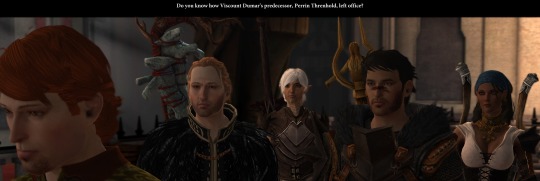


Hawke: What happens if they [the Templars] don’t like the [nobility’s] choice [of viscount]?
Seneschal Bran: Do you know how Viscount Dumar’s predecessor, Perrin Threnhold, left office? He was a tyrant, certainly, but his rule was not ended until he actively sought to expel the templars. “The good of all” is inexorably tied to what is good for the templars.
It’s unclear whether Knight-Captain Meredith was acting on her own initiative in toppling Threnhold or whether she received prior encouragement from the Chantry, but either way, what is certain is that the Chantry moved quickly to legitimize her actions and bolster the new order. Moreover, the intent to seize power for the Chantry and its military forces rather than “liberate” Kirkwall from the depredations of a tyrannical viscount can be seen in the way they illegally imposed their own viscount (one kept submissive through threats of violence) rather than allowing the people to choose or at the very least following accepted selection procedures (i.e., allowing the nobility to vote on the next viscount). Indeed, this refusal to let the nobility select the viscount as per tradition is the basis of Orsino's protest at the beginning of Act 3.
In any event, Grand Cleric Elthina, as the highest-ranking representative of the Chantry in Kirkwall (appointed to her position by Divine Beatrix III herself around 20 years before Act 1) and thus exercising authority over its Templars, presided over the show trial at the end of which Threnhold was imprisoned and later murdered in his cell. Then she rewarded Meredith with a promotion.
According to the codex for Knight-Commander Meredith:
She is credited with removing the previous viscount, Perrin Threnhold, from his position after he attempted to have the templars expelled from the city in 9:21 Dragon. The acting knight-commander was arrested and executed, and Meredith led a group of templars into the heart of the Keep to capture Threnhold. He was tried and imprisoned three days later by Grand Cleric Elthina and died from poisoning two years later. Meredith was subsequently elevated to her current position.
While merely implied here, Elthina is explicitly confirmed to have given Meredith the position of knight-commander in the first place in World of Thedas vol. 2 (p. 193):
Following Threnhold’s arrest, Grand Cleric Elthina appointed Meredith as the new knight-commander. At Knight-Commander Meredith’s suggestion, a new viscount was chosen: a man named Marlowe Dumar.
Then in blatant violation of Kirkwall’s own laws and traditions -- again, dictating that the viscount be chosen by the nobility -- the Chantry had allowed newly-installed Knight-Commander Meredith to select the new viscount. If approached in the Templar-occupied Viscount’s Keep and spoken to in Act 3, Seneschal Bran will explain:
Bran: When a line is judged unfit, or ends, we appoint from Kirkwall’s elite. Or we would, if the situation was normal. But it is not.
Hawke: Who nominates a new viscount?
Bran: A consensus of the nobility. Normally. And a willing nominee.
It seems to be the general consensus that Marlowe Dumar was chosen specifically because he was weak and willing to play the role of Templar/Chantry puppet (a subheading in Dumar’s WoT v2 entry even explicitly calls him “The Puppet”). Meredith, after all, is not only responsible for his appointment but has been threatening him into compliance from the very beginning.
Again, Brother Genitivi writes quite bluntly:
Knight-Commander Meredith appointed Lord Marlowe Dumar as the new viscount in 9:21 Dragon and she has remained influential in the city's rule ever since.
And quoting once more from the unnamed servant:
Now the Chantry has chosen Lord Marlowe Dumar as his replacement. After weeks and weeks of arguing, after telling the nobility that they would be choosing their viscount, after everyone saying it was time to use a new title—why not "king"? Why keep using the name imposed by the Orlesians? And after all that, the Chantry chose him. I suppose I can see why—everyone thinks he has the spine of a jellyfish, and it does seem that way.
Truly, he has the templars on one side, the nobility on the other, and everyone expects him to solve all their problems—yet he has no power to actually accomplish it. He keeps the peace as best he can, and I think he does a good job even if no one else does.
Likewise, to quote from Marlowe Dumar’s entry in World of Thedas vol. 2 (p. 184-185):
The new knight-commander, Meredith, appointed Marlowe to the seat, much to his surprise. Just before he was crowned, he met in private with the knight-commander at the Gallows. Marlowe was escorted, surrounded by grim templars, to Meredith’s well-appointed office, and there, she explained her reasons for the choice. Kirkwall was filled with entitled degenerates... “With my help, you will turn this city around,” she said. “We will be allies.” Meredith’s message was clear: Remember who holds power in Kirkwall. Remember what happened to Threnhold when he overreached. To drive her point home, she presented Marlowe with a small carven ivory box at his coronation. The box contained the Threnhold signet ring, misshapen, and crusted with blood. On the inside of the lid were written the words “His fate need not be yours.” Marlowe ruled Kirkwall without incident for almost a decade, in no small part thanks to Meredith’s backing. During his reign, the templars grew even more powerful, and the knight-commander’s influence was evident in almost every one of Marlowe’s decisions.
And from Meredith’s entry in WoT vol. 2 (p. 193):
Meredith presented Dumar with a carved ivory box at his crowning. All present witnessed the viscount going white as a sheet as he opened it... It is not known what the box contained, but the reaction from Dumar made its importance to him obvious. What is certain is that Dumar never openly or strongly defied the templars. Over the course of his reign, Meredith’s grip on Kirkwall grew ever tighter, and Dumar’s failure to act absolutely contributed to the events that led to the mage rebellion.
According to Lord Bellamy, “a longtime political ally of Dumar’s” (p. 193):
“Dumar had a good heart. A good heart and a weak will. On his own he might have made a good leader, given time. But he wasn’t on his own. The knight-commander was always there, looking over his shoulder. She let him know she was watching, that he wore the crown at her sufferance. Meredith appointed him. This was a nobleman of only moderate wealth, with little influence. She knew she could control him and there was little he or anyone else could do about it.”
Ultimately, the coup not only secured Chantry control over Kirkwall but furthered their (and the Orlesian Empire’s) geopolitical interests in the Free Marches as a whole. After all, the “Free Marches is [sic] best known as the breadbasket of Thedas. Its farms along the banks of the great Minanter river are the source of much of the continent’s food” (World of Thedas vol. 1, p. 65), and as with many a real-world “breadbasket,” its natural abundance and misfortune of lying between multiple empires had made it the target of one invasion and occupation after another. After the slave revolt of 25 Ancient toppled the Tevinter Imperium’s hold over the region (see Codex: History of Kirkwall: Chapter 2), the city-state of Kirkwall fell to Qunari invasion in 7:56 Storm, then invasion and occupation by the Orlesian Empire in 7:60 Storm, and finally gained its independence about 45 years later in 8:05 Blessed (see Codex: History of Kirkwall: Chapter 3). Prior to the Chantry-instigated coup, Kirkwall had enjoyed independence under a locally-chosen viscount for around 115 years, with Viscount Perrin Threnhold himself ruling for 7 years.
Other city-states of the Free Marches have likewise fallen under the Chantry’s sphere of influence (if not outright control):
Starkhaven is ruled by the Vael family. According to the codex for The Vaels, “They remain devout, dedicating at least one son or daughter per generation to become a cleric in the chantry.” The sole potential heir to the throne of Starkhaven is of course our DLC companion Sebastian Vael, “The Exiled Prince.” To quote from his first codex: “Sebastian Vael is the only surviving son of the ruling family of Starkhaven, which was murdered in a violent coup d'etat. Sebastian cannot forget the irony that he still lives only because his family was so ashamed of his drinking and womanizing that they committed him to the Kirkwall Chantry against his will… Since then, his belief in the Maker and His plan for Thedas have been unshakable. Embracing his new role, Sebastian took vows of poverty and chastity to become a sworn brother of the Chantry... until word of his family's deaths forced him to take up worldly concerns once again.” Elthina appears to have been playing mind games with Sebastian from the very beginning -- first she agrees to have him confined in her Chantry, then poses as a secret benefactor helping him escape from her clutches, with the revelation of her identity as said pretend benefactor leading him to embrace her authority and the life of a Chantry brother with genuine enthusiasm (see the Sebastian short story or his WoT v2 entry for details). After his family’s murder, Elthina urges him to remain with her rather than reclaim the throne. Yet when he gives up on seeking the throne and actually does attempt to return to the Chantry during “a crisis of faith,” he is “turned away by Grand Cleric Elthina, who believed he had not yet committed fully to either course” (see Codex: Sebastian - The Last Three Years), leaving him confused and even more under her thrall than ever.
Ostwick is dominated by the devout, staunchly pro-Chantry Trevelyan family. According to the codex for Trevelyan, the Free Marcher: “It is an old and distinguished family, in good standing among its peers, and with strong ties to the Chantry. Its youngest sons and daughters—those third- or fourth-born children with little chance of becoming heirs—often join the Chantry to become templars or clerics.”
Tantervale is certainly... special. According to WoT vol. 1 (p. 71): “Chantry rule is all but absolute in Tantervale, earning the city its dour reputation. The city guard is obsessed with enforcement. A street urchin would get a year in the dungeon for something that would get him a pat on the back in Orlais” (p. 71).
But let us return to Kirkwall, shall we?
"The Puppet”: The Reign of Viscount Marlowe Dumar (9:21-9:34 Dragon)
Viscount Marlow Dumar’s status as an impotent tool of the Chantry and its Templars appears to be common knowledge in Kirkwall. Various characters, from city guards to lowlifes like Gamlen, casually refer to Meredith as if she is head of state and defer to her authority.
Immediately upon approaching the gates of the city in the first quest of the game, The Destruction of Lothering (Act 1), the following exchange occurs:
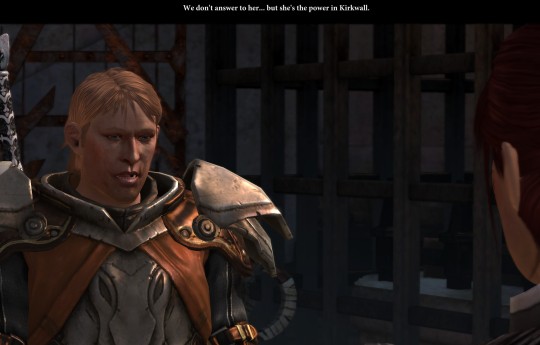


Guardsman Wright: So Knight-Commander Meredith wants us to sort you all out. Most of you are getting right back on your ships, though.
Hawke: That's a templar title. Why would a city guardsman answer to the templars?
Wright: We don't answer to her... but she's the power in Kirkwall. Don't know what would happen if the viscount went against something she wanted... But he's sure never taken that chance.
Likewise, if asked about “the word on the street,” Corff the bartender remarks as early as Act 1, “People say Meredith's the real power in Kirkwall, not the Viscount. Even Dumar answers to her.”
Ordinary citizens appear terrified of Meredith, and with good reason. During the quest Enemies Among Us (Act 1, set in 9:31 Dragon), we get the following exchange with the sister of a Templar recruit:
Macha: I pleaded with him not to join the Order, but he wouldn't listen. You hear dark rumors about the templars and Knight-Commander Meredith. And now my brother is gone.
Hawke: (“Are templars so bad here?”) In Lothering, some templars died protecting villagers. I never heard any dark rumors.
Macha: And those are the stories my Keran adored. But it is not like that here, serah. There is a growing darkness in the order. They prowl the streets in packs. Hunting. And now, they say their duties put them above us, that they have the right to... take people from their homes. It is frightening.
Hawke: (“Tell me about Meredith”) What do people say about Knight-Commander Meredith?
Macha: Oh, she has many admirers. They laud the service she does in keeping the mages in check. But others say she is terribly fierce and utterly without pity. That she sees demons everywhere. It is dangerous even to whisper such things. People harboring escaped mages just disappear. Templars interrogate and threaten passers-by. My friend has a cousin who’s a mage, and she says he was made Tranquil against his will. You hear more with each passing day.
Of course, Knight-Commander Meredith’s reign over the Gallows was notoriously brutal long before she came into contact with Red Lyrium. Writing 3 years after the coup (but 7 years before Act 1), in 9:24 Dragon, Brother Genitivi remarks that "Kirkwall has been a tinderbox since becoming the center of templar power in eastern Thedas." As early as Act 1, mages in the Gallows can be heard crying out, “This place is a prison,” and “Knight-Commander Meredith would kill us all if she could.” When asked if mages are imprisoned, the guardsman replies, “Used to be, back in the Imperial days. They kept slaves here until the rebellion. Now the templars run it and use it to lock up their mages. Guess not much has changed” (The Destruction of Lothering, Act 1). Karl Thekla’s final letter before being turned Tranquil (with such illegal uses of the Rite having been repeatedly reported to Meredith) “said the knight-commander was turning the Circle into a prison. Mages are locked in their cells, refused appearances at court, made Tranquil for the slightest crimes” (Tranquility, Act 1). If Hawke questions the truth of these accusations, Anders responds, “Ask any mage in Kirkwall. Over a dozen were made Tranquil just this year. The more people you ask, the worse the rumors become.” (Elthina also appears to be aware at least to some extent of the subsequent ambush, in which a Tranquil Karl was used as bait to ensnare his former lover).
According to the short story Paper & Steel (focusing on Samson): “Under Meredith, freedom was a cruel dream for Kirkwall’s Circle mages. They were often locked in their cells, watched night and day by templars who were told any step out of line was suspicious. All those young magelings, told that magic was a curse, that they were dangerous, and that they had to be shut indoors all their lives looking out through those windows. Some went mad. Others, mad or not, tried jumping.” And from First Enchanter Orsino’s entry in World of Thedas, vol. 2 (p. 195): “Every time a mage died by their own hand, Orsino would hear Maud’s final words to him: 'This is no life.’ The templars didn’t seem to care about the suicides. Most had the courtesy to say nothing at all, but some would snigger when they thought no one was listening. 'One less to worry about.’ ‘The only good mage is a dead mage.’ Orsino’s anger at the templars grew...” (Note that this began long before Orsino became first enchanter in 9:28, three years before the start of the game). It's also worth noting Knight-Captain Cullen Rutherford quite explicitly attained his position as second-in-command of the Kirkwall Templars position because of his anti-mage extremism, later including violence against those perceived as mage sympathizers and their families.
To name more specific abuses, the Gallows features whipping posts (with dialogue confirming the reliance on whipping) and multiple other medieval torture devices, including a rack, a pillory, and iron maidens. We also see numerous references to casual beatings, sexual assaults, forced Tranquility and facial branding, long-term confinement in dark cells, and permanent family separation (e.g., Emile du Launcet). Escape attempts are typically punished with summary execution, according to multiple sources (e.g., Ser Thrask, Ser Karras, Grace). According to Ser Thrask, the most sympathetic Templar (besides Carver), kindness to mages would be a "badge of shame" among among his colleagues. For more, I recommend checking out the “DA2 mage rights reference post” by @bubonickitten. Again, note that these are cruelties largely occurring prior to or during Act 1, long before Meredith started going insane due to Red Lyrium.
If Feynriel is forced into the Circle at the end of Wayward Son (Act 1), the ex-Templar Samson says, “I hear they got your boy Feynriel locked up in the Circle. Bad business, that. It ain't all templars that're bad. It's hard luck being born a robe, but most places, they make it work. That bitch Meredith runs the Order in this town like her private army. You don't toe the line, you end up on the next corner here in Darktown. I don't think you got to hate mages to love the Order. But Meredith don't agree.” Samson, it should be remembered, had been expelled from the Templar Order for passing love notes from the mage Maddox to his lover. For the crime of “corrupting the moral integrity of a templar,” Meredith ordered Maddox turned Tranquil. According to Cullen in Before the Dawn (DAI), “Knight-Commander Meredith wielded the brand for far lesser offences, believe me."
Ordinary citizens appear to be well aware of at least some of Meredith’s reign of terror in the Gallows, given that various NPCs (including some who do not personally know any inmates) will refer to it. During Tranquility (Act 1), for example, a mob of Ferelden refugees threatens the party over fears that the latter intend to turn in “The Healer of Darktown” to the Templars. One exclaims, "We know what happens to mages in this town. And it ain’t gonna happen to him." Moreover, the knowledge is sufficiently widespread as to have reached faraway countries. A note dated 9:35 (set between Acts 2-3) from a mage of the Hossberg Circle in the Anderfels expresses utter horror: “I have heard that in the Kirkwall Gallows, mages are locked in their cells with barely room to stretch, let alone exercise. I can promise you that any mage of the Anderfels would be stark raving mad after a week of such treatment... No wonder Kirkwall has such trouble with blood mages” (WoT v2, p. 173).
And through all of this, Meredith has the support of the Chantry and more specifically Grand Cleric Elthina.
Not only did Elthina appoint Meredith to her position in the first place (WoT v2, p. 193), but if asked her opinion on Meredith in Act 1, Elthina snaps, “Gossip is a sin, child. Knight-Commander Meredith has an admirable devotion to her duties. It is not my role to form opinions on her character.” An odd statement to make about a subordinate, since Meredith reports to her directly (as knight-commanders legally do to the nearest grand cleric). The codex for Knight-Commander Meredith confirms at as of the end of Act 2, “she enjoys the grand cleric's full support and has free rein in Kirkwall as the commander of its most powerful military force.” According to Elthina’s codex, many claim that Elthina “allows Knight-Commander Meredith more leeway with each passing year.” According to World of Thedas vol. 2, which tries to put a more positive spin on Elthina’s role, her detractors “say her stubborn refusal to exercise her Chantry-given authority allowed the conflict between the templars and mages to escalate, finally resulting in the disastrous mage rebellion of 9:37 Dragon... Since Elthina was loath to exploit her authority as grand cleric, she refused to order either the mages or templars to stand down when tensions flared. Many believe that she could have forced one side to retreat by showing her support for their position, but Elthina refused to take sides” (p. 196-197). This is at best an abdication of responsibility to dependents for someone intent on remaining in power.
Moreover, Elthina’s dominance over Kirkwall appears to depend in large part on at least appearing to manage Meredith and her troops. According to her codex, “People frequently turn to her to mediate disputes—particularly those involving the powerful Templar Order, over whom she holds authority as the Chantry's ranking representative.” So Meredith as military leader rules both the Circle and the city-state through fear and violence, while Elthina maintains her power by playing Good Cop to Meredith's Bad Cop. Both then maintain a pretense of legality and legitimacy by fronting Viscount Dumar as the public face of the regime.
And this dual-power system works quite well for them -- at least until Meredith starts losing her mind under the influence of the Red Lyrium idol.
[A link will later be provided for Part 2 on Escalation and Direct Rule. If I ever do get to it 😭😭😭]
#dragon age 2#dragon age#dragon age lore#dragon age meta#da meta#chantry critical#anti chantry#anti orlais#templar critical#anti templar#da2#knight commander meredith#meredith stannard#kirkwall#kirkwall gallows#grand cleric elthina#elthina critical#Cullen critical#viscount marlowe dumar#orlais#free marches#orlais critical
738 notes
·
View notes
Text
various and sundry artbook tidbits i found interesting (SPOILERS AHEAD FOR THE VEILGUARD ARTBOOK. obviously)
faction & location stuff:
a sketch page from the very early days exploring shape languages for factions like elves, dwarves, wardens, the necropolis, tevinter, and rivain, also includes concepts for the mages’ college and the ben-hassrath
early rivain concept arts have npcs with a similar armour patterning to duncan’s, suggesting it’s a mark of his rivaini heritage like i always thought!
the depiction of the ““creation story”” suggests elves were mimicking the bodies of dwarves when they formed their own, not humans like i think mythal says in game flashbacks, which would make more sense timeline wise
there’s concept art of the city of ventus, which i believe is of particular relevance to mercar players? it’s right on the border of arlathan forest, and surrounded by magical statues holding out raised hands forming a ward along the tree line to keep it from encroaching
the home base was going to be a lovable fixer-upper of a ship given to us by isabela, named the dumat. this didn’t fit the spy theme they were originally going for, so they tried really really hard to make it a submarine without feeling anachronistic by making it sort of sea monster shaped. there are a lot of cutaways and schematics. they were going to give it a mystery engine that you would get light fetch quests to feed random objects: “ten dried lavender flowers, five quail’s eggs, three brass belt buckles, etc.....” the submarine then turned into an undersea mansion on the back of some giant shambling sea creature you would never get a good look at
later on there were some funny takes on the lighthouse specifically, like bringing back the sea creature theme to put it on the back of an interdimensional veil whale, or having it be the true location of the black emporium with a collection of eluvians that xenon the antiquarian lets you use
there’s a tiny concept art for a “high-speed aravel chase” in a canyon like a western
tevinter gladiators are mentioned a couple times. we WEREEE going to get to see the minrathous proving grounds :( there’s also a dwarven embassy concept art somebody take me out back and shoot me
there are a lot of ghilan’nain creature designs that didn’t make it into the game which is a shame but i can see why they would have been resource heavy
the antiva concept arts are so gorgeous. a lot of it got through! and definitely the overall Vibe made it. at some point it seems to have been antiva city itself; they don’t call it treviso and they mention the circle of magi as a major landmark
“The entrance to the Necropolis is like an inverted Tower of Babel. They seek knowledge in the grave instead of heaven.” <- this just rules as a line
for arlathan: “To differentiate it from previous forest and jungle locations in Dragon Age, we went with an autumnal colour palette. It has the benefit to feeling ominously like the end.”
the veil jumpers have a “skull halla” symbol that “implies their willingness to risk death”. did that end up in the game?
“With each faction, we explored a range of aspirational fantasies. For the Wardens, this ranged from knights in shining armour to butal tanks to a Nietzche quote: ‘Beware that, when fighting monsters, you yourself do not become a monster.’”
there’s this concept among the warden armours for an insane orlesian noblewoman look with the winter palace morrigan corset and a piled high wig, but the skirts torn knee length and a serrated fan in hand. i’m kind of obsessed
“To bring more life to the world, we thought about what industries would keep the Anderfels afloat. We took the prominent Warden blue colour and envisioned an industry harvesting flowers, creating dye, and then weaving copious amounts of blue fabric.” this is probably where the flower quests in the hossberg wetlands started off conceptually? v cute
character stuff:
in completely different early versions of the game, solas had a “bad cop” right hand woman called reva
imshael the desire demon/choice spirit from the masked empire and inquisition was going to be a two-handed weapon warrior companion, and also sexualised now while in largely feminine form, which would have been a Choice. there is one art of him in masculine form, also sexy but still not showing as much skin as the feminine one
as i said, neve was going to be calpernia
taash was a rogue. (they’re still a light-armoured dual wielder so that checks out.) it seems like davrin was briefly a mage. at some points harding seems to have inherited bianca
saarbrak, another qunari companion, seems to have lastest the longest of the abandoned concepts. he’s the only non-canon one who got as far as having a place for him sketched into designs of the lighthouse: “saarbrak’s planning room”. mentions and sightings of what might be him are sporadic and i think you only see his name on that sketch, but i’m connecting it to the description “a potential qunari companion evolved from saarebas to dapper qunari spy, offering a deeper look into qunari culture”
the embroidery on harding’s clothes is how she passes the time while “waiting for days in a sniper perch” on missions. i just thought that was cute
202 notes
·
View notes
Text
i’ve mentioned this before but dorian’s sending crystals are the best bit of dragon age technology to never ever be touched on again in the games. they’re not tevinter. they’re probably ancient elven technology if anything, considering the elven stones with a similar function in dawn of the seeker, but. the veil jumpers don’t have them. nobody else has them. where the fuck did he get those. my theories are:
1. he really did just use the inquisition’s contacts like he says. this one is boring though
2. they’re the same elven stones knight-commander martel and frenic used in dawn of the seeker. they wound up in martel’s possession, and he was killed by cassandra, so there’s a chance they wound up with her. why cassandra would then give them to dorian is unclear but i think it would be funny
2a. he got the stones from cassandra, but she gave them to him because they weren’t functional, and he fixed them. which leads into:
3. he either found and fixed them or made them himself. he’s very skilled and experienced with magical tinkering. he helped alexius make his time travel amulet, and he talks in trespasser about potentially fixing eluvians just from observing them (he doesn’t actually do this as far as we know, but he has enough confidence in his abilities that he thinks he’d be able to, and his read on his own skill level tends to be accurate). he also would rather become wyvern food than admit that he cares about someone so much that he’d put in extensive time and hard work for them, so his “it’s amazing what friendship with the inquisition can get you” would in this case just be him trying to play it cool and it’d be extremely in-character
i lean toward him having gotten them either as old junk from cassandra or as broken artifacts from some tevinter merchant and repaired them as the most likely option (if he could just make them himself there would probably be more than 2 or 3 in existence, no doubt maevaris would have one). but regardless of where he got them it is so fucking hilarious that he even has them in the first place. the only guy in thedas with a cell phone and it’s because he was just that passionate about being able to yap at his best friend/lover while long-distance
#the fact that the veil jumpers don’t even have these really kills me. i’m 99 the writers just forgot about their existence#ALTHOUGH THEY’RE MENTIONED IN HIS LETTER TO A ROMANCED INQ. SO. LMAO. anyway#i do need him carnally#said i was going to sleep didn’t i.#dorian pavus#eliasposts
81 notes
·
View notes
Text
Why The Veilguard Handles Grey Wardens Better than Dragon Age Inquisition: The horrors of the Blight, the Calling and the Cauldron
Grey wardens are by far my favourite part of Dragon Age Lore. On the surface; knights in shining armor who protect the world against an unstoppable nightmare. Underneath; a messed up and dubious order who recruit from the criminals of Thedas and who are doomed to die the moment they sign on with the Wardens.
And while I have a problem with a lot of the factions in DAtV, I think the Grey Wardens are handled excellently, because they're far less sanatised than their counterparts.
Grey wardens are a dodgy organisation filled with dodgy people who the people of Thedas have to tolerate because they are the only people who can protect it from an unwise unstoppable evil force. We're shown this as early as the first act in DAO where Duncan casually stabs a man because he doesn't want to die via the joining. To save the world they make unthinkable decisions and then because those decisions are so unthinkable, they keep all those decisions secret. You, as the Warden in DAO, can do some truly horrific things in the name of stopping the blight.
And Dragon age the Veilguard gets this so right. Davrin is a hero, a monster hunter who wants to do right. And yet he is confronted with the horror of the grey wardens time and time again in his personal quests. He is made to see how the order hides even from its own members the horrific things they do in order to create an illusion that the sacred oath is valient and worth upholding.
The Cauldron was by far one of my favourite parts of DAtV. The fact that all the griffin bones are just unceremoniously thrown in there with absolutely no regard for the sacrifice; the fact that the griffins of old went crazy after they were blighted on purpose to oppose the blight...its horrific and horrible and maybe it was the only way to save the world but surely there was another way?
Similarly, we reach the end of Davrins quest and the blighted Wessinhaupt...this isn't some horrible devious plan, Issya has been driven mad by what she was ordered to do to the griffins, and she can't stand it. She's blighted by the blood in her veins, just like she blighted her griffins. And the idea that some who fall pray to the calling end up there in this fact Wessinhaupt, their minds so twisted that they can't tell whats real anymore...it's so messed up I love it.
And yet we still have good grey warden characters just like we always have! Antone and Evka were my favourite side characters in any faction in this game. Do I wish the Grey Warden Commander had a little more nuance to him? Yes. But that's literally the only thing I have a big issue with. It's so interesting as well that with Antone and Evka in charge they start to allow people to take the joining without signing up. We know some who have joined before no longer associate with the order (Anders) but this is on a whole new level. It makes sense that they'd make that decision, but the implications about what characters who don't know what to do if they start hearing the calling...its delicious.
But I promised you some juicy DAI vs DAtV on this one, so let me explain. I think DAI's grey warden lore is interesting, but the fact that they're just mindless puppets of an evil Tevinter magister takes the bite out of it. I long for a game where the Grey Wardens are working with Corphyesus of their own violition because it highlights how fucked up they can get. And there's president for it both in The Decent in Da2 AND you as a protagonist might have made that decision to support the archetech in DAI.
In DAtV the wardens aren't morally dubious because they're working with Elganan or being mind controlled or tricked. The wardens are morally dubious because that's what they've always been. They're also heros because that's what they've always been. It's such a wonderful faction and I think they've done incredibly well with it.
In DAI all wardens are hearing the calling but we never really feel the horror of that properly, perhaps because we don't see wardens going down into the deep roads or perhaps because we don't have a (real) warden companion. In DAtV because we go into the deep roads and see these messed up wardens who have been on their calling, it's made more apparent just how terrifying the calling is, how individuals lose their minds and become more and more ghoul like if they don't die first.
And on top of that the Aesthetics! I love the blight boils coming back from DAO, I always found them so creepy and really giving you the full idea that the land is blighted as well as the people, so no crops can grow.
I really loved this part of the game and I'm glad we got it!
182 notes
·
View notes
Text
got this insane urge to become a keyboard warrior when i saw someone say samson and cullen could've easily swapped places in DAI and that we never see cullen's character growth ect. - which is...imo the dumbest take i've ever heard. Samson...the lyrium addict in dark town that was selling mages into slavery for his addiction...Samson who thinks meredith is a mad dog hawk should put down....samson the guy who if u get him back into the templar order regresses back into his addiction... you think Cassandra would pick HIM to be the commander of the Inquistion back when it only existed to mediate the conflict between mages/templars when Cullen was de-facto Knight Commander of Kirkwall for two whole years???? How would corypheaus - a TEVINTER MAGE magister (who mind u, is portrayed as being akin to the serpent in the garden of eden according to the chant of light) be able to manipulate someone who is off lyrium, a devout andrastian, so ferelden he probably named his kids after his favorite mabari, and hated mages with a burning passion for a large chunk of his life. Be serious....his character arc isn't even about addiction its about what it means to seek redemption for for all the self hatred he allowed to grow inside of him after Kinloch Hold, how atonement is found through REDEMPTIVE ACTS instead of karmic punishment. Even his scenes where he struggles with the philtrum of lyrium aren't actually about his addiction they are about his self loathing- and why he needs to get away from the chantry because he did not like the man he became when he served under it- I DIGRESS but typing this out made me realize none of the companions in DATV have this kind of pull, they're not interesting to talk about or hyper fixate on 😗 its been like 6 months since I first played DAI and im still in love w cullen, but I can't remember the plot of datv anymore
#cullen rutherford#if i've learned anything abt the da community is yall can be damn annoying abt the companions (i say that lovingly) 🚬#we used to be a proper community w 5 paragraphy essay styled posts about blorbos and then name calling when we didn't like so and so's#interpretation of said blorbo's motivations and feelings#oomf was right this game should've rivaled bg3 in terms of writing and horniness instead it went out like a wet fart on a silent night 😭#da posting#datv#datv critical
140 notes
·
View notes
Text
A BioWare Guide on How to Murder a Fanbase
I have been a Dragon Age super-fan for almost fourteen years, now. I have played every game, with every DLC. I have read every novel, lore book, and every comic — yes, even the terrible ones that are better off forgotten. I have seen the anime film, the animated series, and the web mini-series. I have enjoyed all of these pieces of the franchise over and over, more times than I can count. So, make no mistake: the negativity you’re about to hear comes from a place of love for this fantasy world, developed by many creative people over the years. I would love nothing more than to see the resurrection of passion in the Dragon Age fandom again. But the unfortunate truth is, that resurrection is only needed because BioWare took the fandom out back and shot it in the first place.
In December 2018, three years after the release of Dragon Age: Inquisition’s Trespasser epilogue DLC, BioWare first announced the then-untitled next Dragon Age game with a teaser trailer. At this point, most fans were anticipating this would mean within the next couple years, we would see the game. This assumption was based on the fact that Dragon Age: Inquisition was first announced in 2012, and released in 2014, with an extra year of development added last minute.
There have been dribbles of extra content since then, adding to the franchise. This was enough to keep some fans still breathing and interested. 2020’s Dragon Age: Tevinter Nights was a lovely anthology. 2020’s Dragon Age: Blue Wraith and 2021’s Dark Fortress were wonderful comics tying up the story started in Knight Errant. And 2022’s Dragon Age: Absolution was a well-animated series with an interesting cast of characters and story. But all these still left the fandom with a major question: What was going on with the next game? It was untypical of BioWare to be so secretive, in comparison to how they handled sharing information of the past games in the franchise. The only form of updates fans still have to go on is mostly just concept art and short stories, hinting that something must be in production. But why was the wait so long?
In 2015, the first version of the next Dragon Age began with a clear vision, clear scope of practice, and a reportedly happy developer team. Most gloriously in my book, there was no multi-player… but this did not align with the Electronic Arts typical money-mad schemes. EA’s push for “games as a service” meant they wanted to monetize all their games as much as possible, and therefore, they wanted them to be a live service — as Anthem demonstrated, that meant sacrificing things that are staples of good RPGs, like narrative and character choice. So in 2017, version one of the next Dragon Age was scrapped and replaced. This new version would have, in total or to at least some degree, an online portion of play.
There is one part of Schreier’s article, “The Past and Present of Dragon Age 4,” that really sticks out to me, regarding this:
“One person close to the game told me this week that Morrison’s critical path, or main story, would be designed for single-player and that goal of the multiplayer elements would be to keep people engaged so that they would actually stick with post-launch content.”
The idea of splitting up components of a game into single-player and multi-player is a terrible idea, because it means that there would be a large bulk of content only accessible through online gaming; something many fans, like myself, are repulsed by. Even if I did enjoy it, I spent most of my life growing up with either no internet or shoddy internet incapable of playing online games. I know many rural people who are still in that position, losing more and more of their favourite gaming pastimes because they are locked out of the ability to play them. It is a disservice to hide content behind a wall like this, especially in a world that is so lore-heavy like Dragon Age. The news of multi-player in Dragon Age understandably upset many, and this is when I first noticed a large drop off in excitement over the next game.
However, in 2021, the failure of Anthem (multi-player) and success of Star Wars Jedi: Fallen Order (single-player) led the executives at EA to bend to the wishes of BioWare leadership and allow them to go back to the drawing board yet again on the next Dragon Age. This meant removing all multi-player content!
While I am very happy that there will reportedly be no multi-player in Dragon Age: Dreadwolf, I can’t help but feel bitter and a little disgusted over the ridiculous development time spent on something no one but EA wanted in the first place. If it weren’t for this foolishness, Dragon Age: Dreadwolf would be in our hands right now. Instead, it’s been in development hell for nearly nine years and counting. Nine years is a long time to expect fans to carry a torch for you through radio silence, but it’s no wonder BioWare has shared barely anything about the next game; it’s been in flux for so long, they likely haven’t had anything concrete to show.
BioWare hurt its reputation even more when the news broke that the studio very suddenly laid off 50 people who were working on Dragon Age: Dreadwolf. This is pretty damning on its own, but BioWare took it a step further. Former developer Jon Renish shared a statement revealing that the studio was only willing to offer laid-off employees two weeks of severance per year of service, and denied health benefits. The denial of health benefits in particular is a pretty wild move for a studio with a reputation for “stress casualties”. The latest news on this is that BioWare has still so far refused to negotiate better severance packages, leading to a lawsuit. The lawsuit originally had 15 former employees, but this dropped due to the fear of not being able to afford to pay their bills. So now, while EA sits on $400 million net income, the laid-off employees are struggling to buy holiday presents for their children. These horrid business practices are not to be ignored when accounting for a lack of faith in a studio. What kind of monsters reward workers who make your games special with vaguely reasoned lay-offs?
The latest news on the Dragon Age: Dreadwolf front from BioWare came early this month, December 2023, with a trailer… announcing a trailer that will come next summer… that will announce the release of the game. Supposedly. Maybe. We’ll see. But by this time, BioWare is something of a laughing stock of their own fandom. Reactions to the video released with a pretty map graphic and a few rendered locations were, from what I personally observed, mostly sardonic in nature. People have commented on the vapourware nature of the game, and like all vapourware, that leads to disintegrating trust.
Despite all this, people like Mary Kirby, (one of the veteran Dragon Age writers who was a victim of the layoffs,) said, “it’s bittersweet that Dreadwolf is my last DA game, but I still hope you all love it as much as I do,” encouraging fans to still support the game when it eventually is released. But after every misstep BioWare has taken, that’s a tough sell now. Fans are finicky, RPG fans more so than others, one could argue. We have our favourites, and many of us stick to those favourites for life over our appreciation for the artistry — but that relationship between studio and fan should go both ways. EA and BioWare has betrayed that relationship, and it will take a hell of a lot to build it back up again, now.
[This piece is also available on Medium!]
#dragon age#datv#dragon age dreadwolf#bioware#game development#meta#releasing this into the wild and running away
658 notes
·
View notes